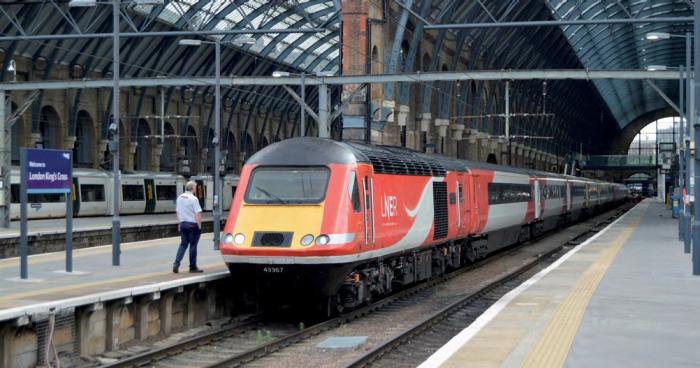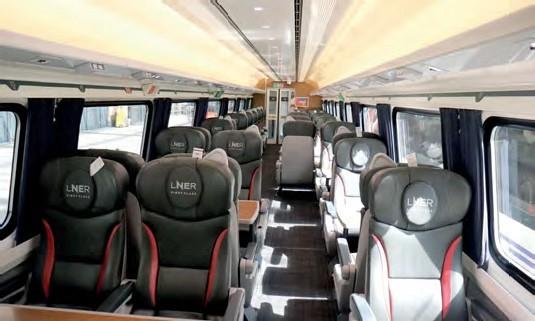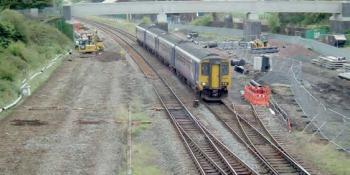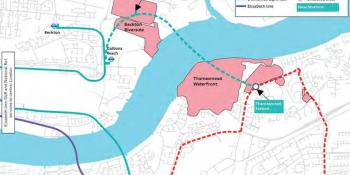AZUMA INTRODUCTION STILL PLANNED FOR DECEMBER

THE NEW London North Eastern Railway operation on the East Coast main line launched with minimal fanfare on 25 June, the day after it took over operation of the route from Virgin Trains East Coast.
The Stagecoach/Virgin consortium had been due to operate VTEC until at least 2023, but financial challenges with the agreed franchise payments led to the deal ending early. In a statement, VTEC said ‘A slowdown in long-distance rail travel in the early years of the franchise led to Stagecoach/Virgin subsidising premia payments to Government with more than £200 million of shareholders’ money and the early end of the East Coast contract’.
Rather than agreeing a new contract with VTEC, Transport Secretary Chris Grayling opted to bring in the Department for Transport’s Operator of Last Resort to operate services. He plans for a new East Coast Partnership arrangement, bringing together operations and infrastructure on the route, to start in 2020 and for the OLR operation to provide a transition to this structure.
The LNER name is intended to be the new long-term brand for the operation, which Mr Grayling has said will ‘begin the task of working with Network Rail to bring together the teams operating the track and trains on the LNER network’. Former Network Rail Managing Director, Network Operations Robin Gisby has been appointed as Chair of LNER, while former VTEC Managing Director David Horne continues to lead a team largely comprising the same senior management to ensure continuity. Senior figures at the launch event highlighted the extensive work to ensure a smooth transition in the five-week period for which notice was given of the change of operator.

AZUMA INTRODUCTION
The first major landmark for LNER will be introducing the new Hitachi-built Class 800/801 trains onto the route, with the first passenger service still planned for December. LNER is set to retain the ‘Azuma’ name coined for the trains by VTEC, with 65 trains, a mixture of five-car and nine-car BMUs and EMUs, to be introduced; these were ordered by the Department for Transport under the Inter-city Express Programme (IEP).
LNER Managing Director David Horne told Modern Railways at the launch event that driver training on the Azumas had begun the previous week, with the aim being for Hitachi to deliver the first approved train in November. LNER Engineering Director John Doughty explained the initial diagrams for Azumas will mostly be on London to Leeds services, with the first diagram for a nine-car Class 800 bi-mode to replace the East Midlands Trains HST that works the daily services between Hull and London, with a return trip to Leeds in-between.
Mr Doughty also told Modern Railways plans to withdraw the existing fleet had been amended due to delays in completing power supply upgrade work on the line. The first Azumas will therefore replace Class 91/Mk 4 electric sets, with around half of these to be withdrawn before the first HSTs are removed from service, after which the remaining electric sets would be removed. This, he explained, would keep ‘the quantum of electric trains’ similar to that currently seen on the route until the necessary upgrades have been completed. Mr Doughty confirmed current plans envisage all HSTs being withdrawn by the end of 2019, after which they will not be compliant with Persons with Reduced Mobility (PRM) regulations.
Following the Azuma introduction, LNER also intends to introduce its first set of major timetable enhancements in May 2019, chiefly comprising additional services to Bradford, Lincoln and Harrogate. Further additions will then follow, although Mr Doughty said VTEC’s original plan to retain some Class 91/Mk 4 sets for fast London to Edinburgh services had been abandoned because the track access rights to operate these services would not be available until May 2021, meaning ‘the window of opportunity’ to retain the sets is no longer there. He said LNER would be seeking to understand if space on the infrastructure would be available to operate the proposed fast services, which are planned to achieve a 4-hr London to Edinburgh timing, before working up a rolling stock solution.
Time to reboot Inter-city East Coast? – ‘Informed Sources’, p32




